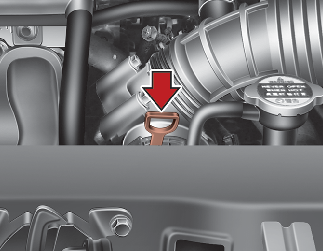Checking the automatic transmission fluid level

The automatic transmission fluid level should be checked regularly.
Keep the vehicle on level ground with the parking brake applied and check the fluid level according to the following procedure.
-
Place the shift lever in N (Neutral) position and confirm if the engine is running at normal idle speed.
-
After the transmission is warmed up sufficiently [fluid temperature 70~80°C (158~176°F)], for example by 10 minutes usual driving, move the shift lever through all positions then place the shift lever in N(Neutral) or P(Park) position.

-
Confirm if the fluid level is in the "HOT (A)" range on the level gauge. If the fluid level is lower, add the specified fluid from the fill hole. If the fluid level is higher, drain the fluid from the drain hole.
-
If the fluid level is checked in cold condition [fluid temperature 20~30°C (68~86°F)], add the fluid to the "COLD (B)" line and then recheck the fluid level according to the above step 2.

Transmission fluid
The transmission fluid level should be checked when the engine is at normal operating temperature. This means that the engine, radiator, radiator hose and exhaust system etc., are very hot. Exercise great care not to burn yourself during this procedure.

-
Low fluid level causes trans-mission shift slippage. Overfilling can cause foaming, loss of fluid and transmission malfunction.
-
The use of a non-specified fluid could cause transmission malfunction and failure.

Parking brake
To avoid sudden movement of the vehicle, apply the parking brake and depress the brake pedal before moving the shift lever.

The “COLD” range is for reference only and should NOT be used to determine the transmission fluid level.

New automatic transmission fluid should be red. The red dye is added so the assembly plant can identify it as automatic transmission fluid and distinguish it from engine oil or antifreeze. The red dye, which is not an indicator of fluid quality, is not permanent. As the vehicle is driven, the automatic transmission fluid will begin to look darker. The colour may eventually appear light brown.
Use only the specified automatic transmission fluid. (Refer to More Details.)